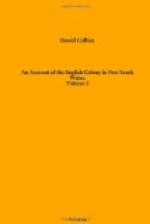[* Adjacent to the town of Sydney.]
In the first part of the month the weather was not very good; about the middle some showers fell very seasonably for the harvest; and towards the latter part the regular land and sea breezes had set in, which kept the weather cool and pleasant.
November.] The month of November opened with the arrival of the Prince of Wales, victualler, from England. She had been close in with Botany Bay the preceding day; but, there being little wind, the master had been obliged to stretch out from the land during the night; and the next morning, a pilot getting on board, she was brought in. She had sailed in company with the Sylph, which also had provisions for the settlement on board, but which did not arrive until the 17th. They brought the information, that a Dutch fleet, consisting of ten sail of ships of war, bound to the East Indies had been captured off the Cape of Good Hope, by His Majesty’s fleet, under Admiral Sir Geo. Keith Elphinstone (now Lord Keith), which had followed them from England.
The useful regulation of numbering the different houses in the town of Sydney, particularly those in the occupation of the convicts, was followed up by another equally serviceable, which directed the inhabitants of each of the four divisions of the town (for into that number it was portioned off) to meet, and from among themselves elect three of the most decent and respectable characters, who were to be approved by the governor, and were to serve for the ensuing year as watchmen, for the purpose of enforcing a proper attention to the good order and tranquillity of their respective divisions. Many of the soldiers being allowed to occupy houses for their families in the vicinity of the barracks, the commanding officer was desired to appoint his own watchmen for the military division of the town, and to order them to report to him.
A few days previous to the arrival of the Sylph, the Colonial schooner returned from Norfolk Island, and brought letters from the Reliance, Supply, and Britannia, which ships left that island on the 25th of the last month, and the day following her arrival (the 14th) Richard Atkins, esq was directed to officiate as judge-advocate of the colony, in the absence of the gentleman who had filled that situation since the first establishment of the settlement, and who had now proceeded to England in the Britannia.
This judicial appointment having taken place, a criminal court was held on the 23rd, and continued sitting, by adjournment, until the 29th, when sentence of death was passed upon eight prisoners who were capitally convicted; one, of the wilful murder of the man whose body had been found on the north shore the 16th of last month, and seven of robbing the public store-houses at Sydney, and the settlement at the Hawkesbury. Two others were found guilty of manslaughter.
Of these miserable people five were executed pursuant to the sentence of the court. At Sydney*, Francis Morgan, for wilful murder, with Martin McEwen (a soldier) and John Lawler (a convict), for robbing the public stores. Matthew McNally and Thomas Doyle, convicts, suffered at Parramatta, on the following day, for the same offence.




